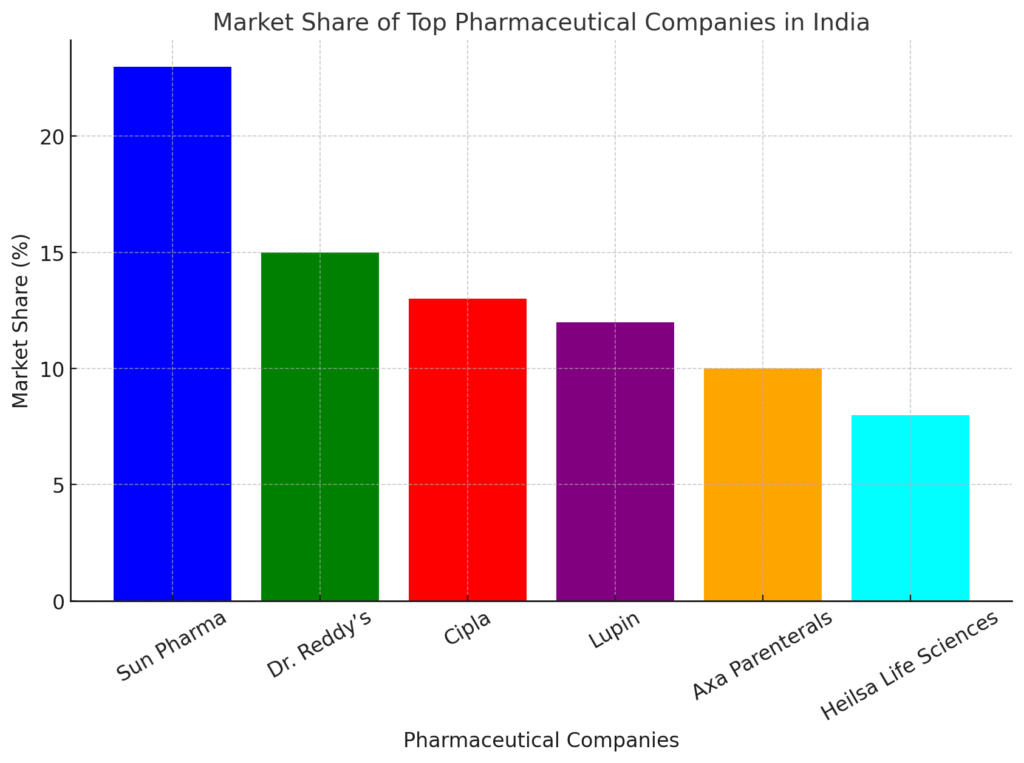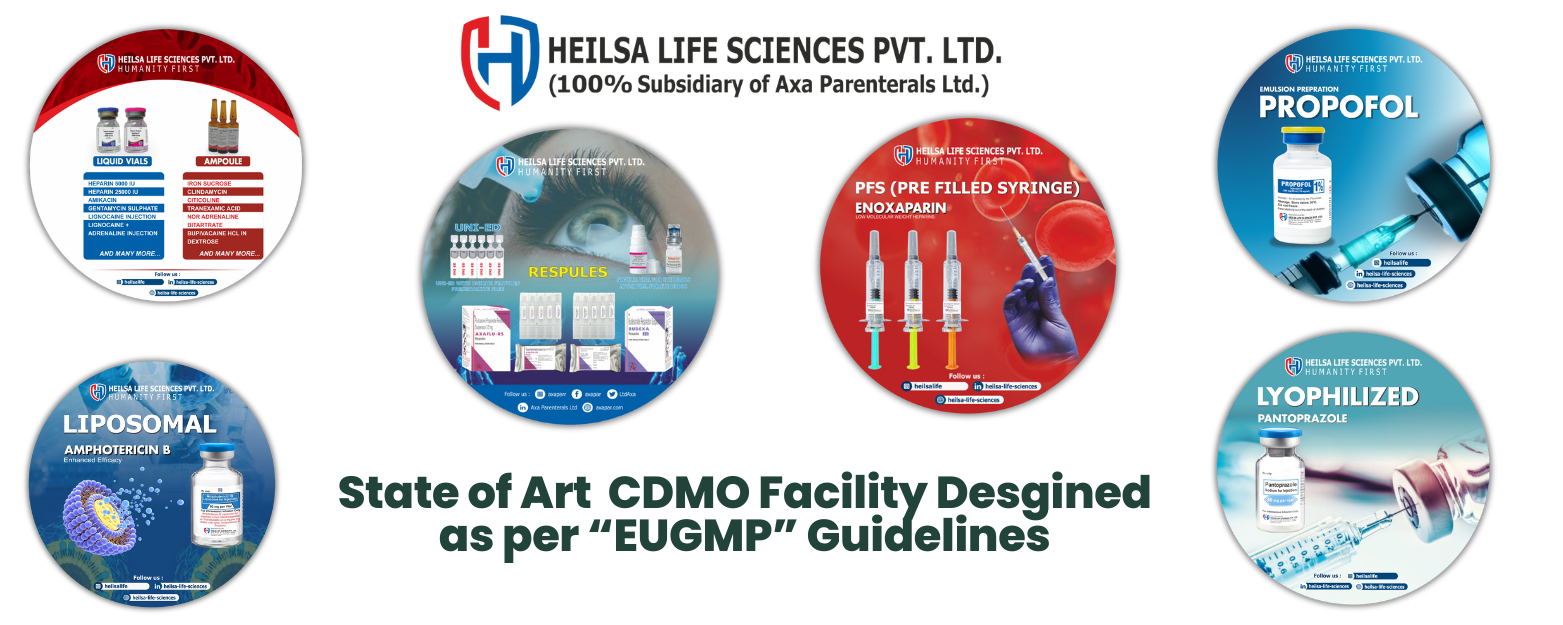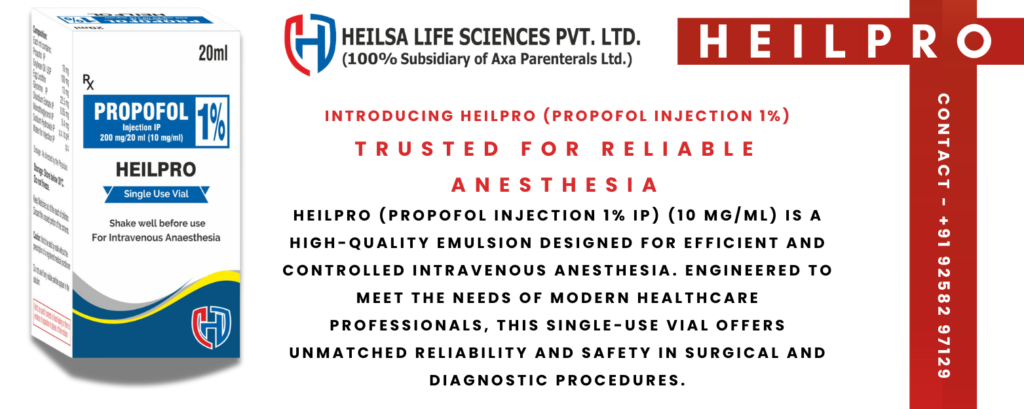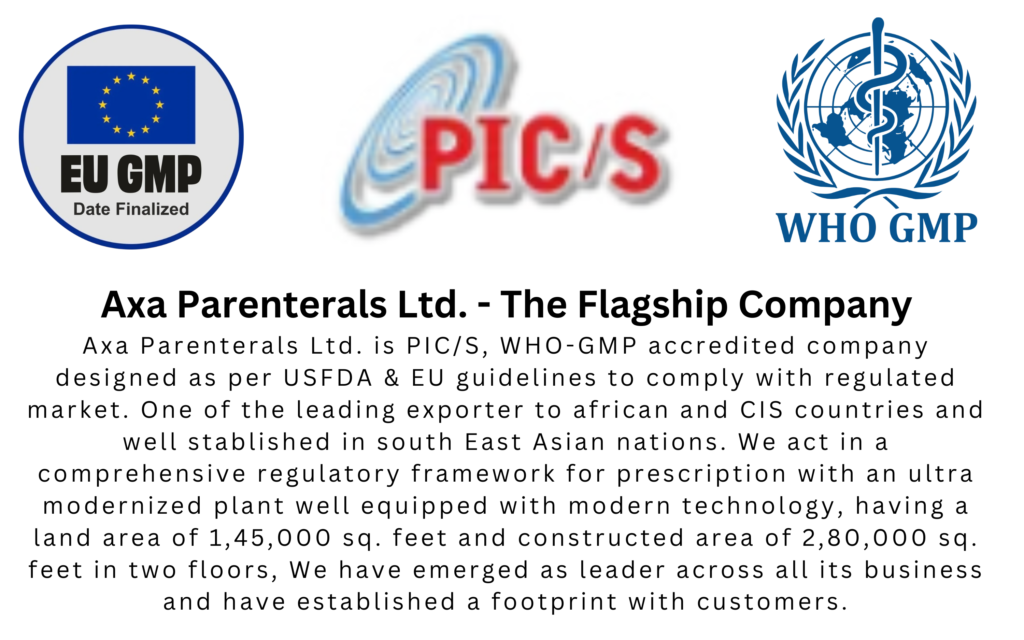Introduction to Pharmacy & Medicine Manufacturers in India
Pharmacy is an essential component of the healthcare system that bridges the gap between medical science and patient care. It involves the preparation, dispensing, and proper utilization of medications to ensure optimal health outcomes. Pharmacists play a crucial role in advising patients and healthcare providers on the safe and effective use of pharmaceutical products.
India is a global leader in pharmacy and medicine manufacturing, known for its high-quality, affordable pharmaceuticals. The country’s pharmaceutical industry, often called the “Pharmacy of the World,” plays a crucial role in producing generic medicines, active pharmaceutical ingredients (APIs), biosimilars, and vaccines. With top medicine manufacturers like Sun Pharma, Dr. Reddy’s, Cipla, Lupin, Axa Parenterals Ltd., and Heilsa Life Sciences Pvt. Ltd., India ensures cost-effective healthcare solutions worldwide. This thriving sector, supported by innovation and regulatory compliance, continues to expand, making India a key player in global pharmaceutical production.

What is Pharma & Pharmacy?
Pharmacy is both a science and a practice. It involves preparing, dispensing, and reviewing drugs while providing additional clinical services. The profession spans a variety of responsibilities, such as formulating and compounding medications and counseling patients on their proper use. Pharmacists are trained to ensure medications are used safely and effectively, improving patient health and well-being.
India is a global leader in pharmacy and medicine manufacturing, with a thriving pharmaceutical industry that plays a crucial role in healthcare worldwide. The country is home to top medicine manufacturers like Sun Pharma, Dr. Reddy’s, Cipla, Lupin, Axa Parenterals Ltd., and Heilsa Life Sciences Pvt. Ltd., known for producing generic medicines, active pharmaceutical ingredients (APIs), biosimilars, and vaccines. With strong regulatory compliance and continuous innovation, India’s pharmacy and medicine manufacturing sector continues to expand, ensuring cost-effective healthcare solutions globally.
Define Pharmacy: An Overview of Its Scope
Pharmacy can be defined as the art and science of preparing and dispensing medications, as well as providing essential health-related services to the public. The scope of pharmacy is vast and includes various specialized fields & Manufacturers in India such as:
Community Pharmacy :
Dispensing medications and offering health advice at retail locations.
Hospital Pharmacy
Collaborating with healthcare teams in hospitals to manage medications for patients.
Clinical Pharmacy
Providing direct patient care and optimizing the use of medications.
Industrial Pharmacy
Involvement in the production, research, and development of pharmaceutical products.
Regulatory Pharmacy
Ensuring compliance with legal and ethical standards in the pharmaceutical industry.
Research and Academia
Conducting studies to develop new medications and teaching future pharmacists.
History of Pharmacy: From Ancient Times to Modern Practices
The history of pharmacy dates back to ancient civilizations, where the use of medicinal plants and natural substances was common for treating ailments. Some key milestones in the evolution of pharmacy include:
Ancient Era:
Early civilizations such as the Egyptians, Greeks, and Chinese utilized herbs and minerals for medicinal purposes. The “Ebers Papyrus,” an ancient Egyptian medical document, contains some of the earliest recorded pharmaceutical knowledge.
Medieval Period:
Pharmacy began to emerge as a distinct profession with apothecaries preparing and selling medicinal compounds. Islamic scholars contributed significantly to the development of pharmacology during this period.
Renaissance and Enlightenment:
The scientific revolution brought advancements in chemistry and biology, leading to a better understanding of drug formulations and their effects.
Modern Era:
The 19th and 20th centuries saw the establishment of pharmaceutical industries, regulatory bodies, and technological advancements in drug development and distribution. Today, pharmacy integrates with healthcare systems to provide comprehensive medication management and patient care.
In conclusion, pharmacy has evolved significantly over the centuries, adapting to new scientific discoveries and technological advancements. It remains a vital field dedicated to improving health outcomes and ensuring the safe and effective use of medications.

Exploring Pharmacy Terminology
Pharmacy is an integral part of the healthcare system, and understanding its terminology is essential for both professionals and patients. The term “pharmacy” carries different meanings and interpretations across cultures and languages, reflecting the diverse ways healthcare is approached globally.
Pharmacy Meaning and Its Interpretations Across Languages
The concept of pharmacy exists universally, yet its interpretation and terminology differ across languages and regions. In essence, pharmacy refers to the science and practice of preparing, dispensing, and reviewing medications, ensuring their safe and effective use. Different languages capture the essence of pharmacy based on cultural contexts and linguistic nuances.
Pharmacy Meaning in Hindi, Marathi, Tamil, Kannada, and Telugu
In India, where multiple languages are spoken, the term “pharmacy” is understood and used differently across various linguistic groups:
Hindi: फार्मेसी (Pharmacy)
Marathi: फार्मसी (Pharmacy)
Tamil: பார்மாகி (Pharmacy)
Kannada: ಫார்மாಸಿ (Pharmacy)
Telugu: ఫార్మసీ (Pharmacy)
Despite the linguistic differences, the core concept of pharmacy remains consistent—focused on the provision of medications and healthcare services to the public.
The Symbol of Pharmacy: What It Represents
The symbol of pharmacy is globally recognized and carries significant meaning. The most common representation is the Bowl of Hygiene, featuring a serpent entwined around a cup or chalice. This symbol has ancient roots in Greek mythology, where Hygiene, the goddess of health and hygiene, was often depicted holding a bowl with a serpent.
The serpent represents wisdom and healing, while the bowl signifies medicine and nourishment. Together, they symbolize the pharmaceutical profession’s commitment to health, well-being, and the responsible use of medicines.
In addition to the Bowl of Hygiene, other pharmacy-related symbols include the Green Cross, commonly used in European countries to signify pharmacies, and the Rx symbol, derived from the Latin word “recipe,” meaning “take.” These symbols help identify pharmacies worldwide and foster trust among patients seeking medical assistance.
Conclusion
Understanding pharmacy terminology across different languages and cultures helps in better communication and accessibility of healthcare services. Recognizing the symbolism associated with pharmacy further enhances the appreciation of the profession’s role in promoting public health and well-being.

Understanding the Pharmaceutical Industry
The pharmaceutical industry is a vital component of global healthcare, dedicated to the research, development, production, and distribution of medications that improve and sustain life. This industry plays a crucial role in public health by providing innovative treatments for various diseases and medical conditions.
What is Pharmaceutical?
The term “pharmaceutical” refers to substances used in the diagnosis, treatment, and prevention of diseases. It encompasses a wide range of products, including prescription drugs, over-the-counter medications, and biologics. Pharmaceuticals are developed through extensive research and clinical trials to ensure their safety, efficacy, and quality.
Define Pharmaceutical and Its Importance in Healthcare
Pharmaceuticals can be defined as medicinal drugs that are manufactured to diagnose, treat, and prevent illnesses in humans and animals. The importance of pharmaceuticals in healthcare cannot be overstated, as they:
Enhance Quality of Life:
Medications help manage chronic conditions such as diabetes, hypertension, and asthma, allowing individuals to lead healthier lives.
Prevent Diseases:
Vaccines and preventive medications reduce the spread of infectious diseases.
Improve Patient Outcomes:
Effective treatments contribute to faster recovery and reduced hospital stays.
Support Healthcare Systems:
Pharmaceuticals play a key role in modern medical practices by complementing surgical and therapeutic interventions.
Pharmaceutical Industry: Global Overview and Trends
The global pharmaceutical industry is one of the fastest-growing sectors, driven by advancements in medical research, biotechnology, and increasing demand for healthcare services. Key trends shaping the industry include:
Personalized Medicine:
Advances in genetics and biotechnology are enabling the development of targeted therapies tailored to individual patients.
Digital Health Integration:
Technologies such as AI, big data, and telemedicine are transforming drug development and patient care.
Biopharmaceutical Growth:
The rise of biologic drugs, including monoclonal antibodies and gene therapies, is revolutionizing treatment approaches.
Regulatory Compliance:
Stringent regulatory frameworks ensure that pharmaceutical products meet safety and efficacy standards across different markets.
Sustainability Initiatives:
Companies are increasingly focusing on sustainable practices to reduce environmental impacts.
Growth of the Pharmaceutical Industry in India
India has emerged as a major player in the global pharmaceutical market, often referred to as the “Pharmacy of the World” due to its vast production capabilities and affordability. Some key factors contributing to the growth of the Indian pharmaceutical industry include:
Cost-Effective Manufacturing: India offers low-cost production with high-quality standards, making it a preferred hub for pharmaceutical exports.
Skilled Workforce: The country has a large pool of skilled professionals, including scientists and researchers, contributing to drug innovation.
Government Support: Various policies and incentives, such as the Production Linked Incentive (PLI) scheme, have boosted industry growth.
Growing Domestic Demand: Rising healthcare awareness, an aging population, and increased healthcare expenditure are driving demand for pharmaceutical products.
Export Market Expansion: India is one of the largest exporters of generic medicines, supplying affordable drugs to countries worldwide.
Conclusion
The pharmaceutical industry continues to evolve, driven by innovation and an increasing demand for healthcare solutions. With significant contributions to public health and economic growth, the industry remains a cornerstone of modern healthcare systems worldwide. India’s pharmaceutical sector, in particular, is poised for sustained growth and global influence.

Key Components of the Pharma Industry
The pharmaceutical industry is a complex and multifaceted sector that plays a crucial role in global healthcare. It encompasses various components that work together to ensure the development, production, and distribution of safe and effective medications. Some of the key components of the pharma industry include:
Research and Development (R&D): This is the backbone of the pharmaceutical industry, focusing on discovering new drugs, improving existing formulations, and conducting clinical trials to ensure safety and efficacy.
Manufacturing and Production: Once a drug is approved, it undergoes large-scale manufacturing under strict quality control and regulatory guidelines.
Regulatory Affairs: Ensuring compliance with laws and guidelines set by regulatory bodies such as the FDA, EMA, and CDSCO to guarantee drug safety and efficacy.
Quality Control and Assurance: Monitoring and maintaining product standards through stringent testing and validation processes.
Marketing and Sales: Educating healthcare professionals and consumers about pharmaceutical products and ensuring their availability in the market.
Distribution and Supply Chain Management: Ensuring timely delivery of pharmaceutical products to healthcare providers and patients.
Introduction to Pharmaceutics: Definition and Scope
Pharmaceutics is a branch of pharmaceutical science that deals with the process of turning a new chemical entity (NCE) into a safe and effective medication for patient use. It covers various aspects of drug formulation, development, and delivery.
Preformulation Studies: Understanding the physical and chemical properties of drug substances.
Formulation Development: Designing and developing dosage forms such as tablets, capsules, and injectables.
Drug Delivery Systems: Creating novel delivery mechanisms like sustained-release and targeted delivery systems.
Biopharmaceutics: Studying how drugs are absorbed, distributed, metabolized, and excreted in the body.
Industrial Pharmacy: Focusing on large-scale production and quality control of pharmaceutical products.
What is the Role of a Pharmacist?
Pharmacists play a vital role in the healthcare system by ensuring the safe and effective use of medications. They act as a bridge between healthcare providers and patients, offering valuable insights into drug interactions, side effects, and proper medication use.
Pharmacist Definition and Responsibilities
A pharmacist is a healthcare professional trained in the science of pharmacy, specializing in preparing, dispensing, and providing information about medications.
Key Responsibilities of a Pharmacist:
Dispensing Medications: Ensuring patients receive the correct medications and dosages as prescribed by healthcare professionals.
Patient Counseling: Educating patients on the proper use of medications, potential side effects, and drug interactions.
Medication Therapy Management (MTM): Collaborating with healthcare providers to optimize patient treatment plans.
Ensuring Compliance: Monitoring prescriptions to prevent misuse and ensure adherence to regulations.
Health Promotion: Providing advice on lifestyle modifications, immunizations, and preventive healthcare.
Conclusion
The pharmaceutical industry, with its key components and dedicated professionals like pharmacists, is essential in ensuring the health and well-being of individuals worldwide. Pharmaceutics as a discipline continues to evolve, offering innovative solutions to modern healthcare challenges.
Pharmacy in India: A Closer Look
India’s pharmaceutical industry is one of the largest and most dynamic in the world, contributing significantly to global healthcare. With its strong manufacturing capabilities, cost-effective production, and skilled workforce, the Indian pharmacy sector plays a crucial role in ensuring the availability of high-quality medicines at affordable prices both domestically and internationally.
Overview of the Indian Pharmacy Market
The Indian pharmacy market is characterized by its rapid growth, driven by increasing healthcare needs, rising incomes, and government support. Key aspects of the market include:
Global Position: India is the largest provider of generic medicines globally, supplying over 50% of global demand for various vaccines and 40% of generic demand in the US.
Market Size: The Indian pharmaceutical industry was valued at approximately USD 50 billion in 2023 and is expected to grow at a CAGR of 10-12% over the next decade.
Key Segments: The market is divided into various segments, including generic drugs, over-the-counter (OTC) medicines, biosimilars, and active pharmaceutical ingredients (APIs).
Export Dominance: Indian pharmaceutical exports reach over 200 countries, with key markets including the US, Europe, and Africa.
Top Pharmaceutical Companies in India
Several pharmaceutical companies in India have gained global recognition for their quality products and innovation. Some of the top players in the industry include:
Sun Pharmaceutical Industries Ltd.: The largest pharma company in India, specializing in generics and specialty medicines.
Dr. Reddy’s Laboratories: Known for its focus on generics, biosimilars, and proprietary products.
Cipla Ltd.: A pioneer in respiratory and anti-retroviral therapies.
Lupin Ltd.: Specializes in cardiovascular, diabetes, and respiratory treatments.
Aurobindo Pharma: A major supplier of generic pharmaceuticals and APIs worldwide.
Biocon Ltd.: A leader in biosimilars and bio pharmaceuticals.
Axa Parenterals ltd. :
AXA Parenterals Ltd is into manufacturing & Marketing Sterile of par enteral preparations, life-saving medicines and hospital products. AXA Parenterals Ltd .
Certificates :

Focuses on innovative healthcare solutions across various therapeutic areas.
Heilsa Life Sciences Pvt. LTD. :
Heilsa Life Sciences differentiates itself in the pharmaceutical sector because of its continual commitment to innovation and quality. Each of our products is manufactured in facilities that comply with EU-GMP standards and WHO-GMP norms, ensuring that every formulation places a high priority on patient safety, performance, and outstanding results. In order to offer the greatest healthcare solutions on the market, we are devoted to ongoing research and development.
Heilsa Life Sciences Pvt. Ltd. is a leading pharmaceutical manufacturer specializing in glass vials products (Liquid, Liposomal, Emulsions, and Lyophilized), glass ampoules, and pre-filled syringes. We excel in anti-cancer injections (Liquid, Lyophilized, and Liposomal) in our dedicated Oncology Product Block. Our EU-GMP and WHO-GMP certified facilities ensure the highest quality, safety, and efficacy of every formulation. As a trusted name in third-party pharma manufacturing, we deliver excellence in Paracetamol Injection and other critical formulations, fostering global health and well-being.
Government Initiatives: Jan Aushadhi Kendra and PM Medical Stores
The Indian government has launched several initiatives to make healthcare affordable and accessible to all citizens. Key programs include:
Pradhan Mantri Bhartiya Janaushadhi Pariyojana (PMBJP):
Launched to provide quality generic medicines at affordable prices through Jan Aushadhi Kendras across India.
Over 9,000 stores have been established nationwide, offering more than 1,600 essential drugs.
Significant cost savings for patients, with medicines priced 50-90% lower than branded alternatives.

PM Medical Stores:
Aims to expand the reach of affordable healthcare solutions, particularly in rural and remote areas.
Encourages the use of generic medicines and reduces healthcare expenditure for lower-income populations.
Ministry of Chemicals and Fertilizers: Its Role in the Pharma Sector
Ministry of Chemicals and Fertilizers: Its Role in the Pharma Sector
The Ministry of Chemicals and Fertilizers, through its Department of Pharmaceuticals, plays a pivotal role in regulating and promoting the pharmaceutical industry in India. Its key responsibilities include:
Policy Formulation: Developing strategies to promote growth, innovation, and self-reliance in the pharmaceutical sector.
Regulatory Oversight: Ensuring compliance with global quality standards and monitoring pricing policies.
Research and Development Support: Encouraging innovation through funding and policy incentives.
Bulk Drug Parks and PLI Scheme: Initiatives to boost domestic API production and reduce dependence on imports.
Conclusion
India’s pharmacy sector continues to thrive, driven by strong government support, innovation, and a robust manufacturing base. With increasing focus on affordability, accessibility, and quality, the country is well-positioned to remain a global leader in pharmaceuticals and healthcare solutions.
Pharma Companies: Leaders in Medicine Manufacturing
Pharmaceutical companies are at the forefront of global healthcare, driving innovation, research, and production of life-saving medications. These companies invest heavily in research and development (R&D) to create new drugs, improve existing treatments, and ensure accessibility to quality medicines across the globe.
What is a Pharmaceutical Company?
A pharmaceutical company is an organization involved in the research, development, manufacturing, and marketing of medications for human and veterinary use. These companies operate under strict regulatory guidelines to ensure drug safety and efficacy. They produce a wide range of products, including prescription medicines, over-the-counter drugs, vaccines, and biologics.
Key functions of a pharmaceutical company include:
Drug Discovery and Development: Conducting clinical trials and laboratory research to develop new treatments.
Manufacturing: Producing medications in compliance with international quality standards.
Regulatory Compliance: Ensuring adherence to guidelines set by regulatory bodies such as the FDA, EMA, and CDSCO.
Marketing and Distribution: Educating healthcare providers and ensuring medicine availability across various markets.
Top Pharma Companies in India and the World
India has established itself as a global pharmaceutical hub, with several companies leading the charge in medicine production and exports. Internationally, major pharmaceutical companies continue to dominate the market with cutting-edge innovations and extensive R&D investments.
Top Pharma Companies in India:
Sun Pharmaceutical Industries Ltd.: The largest pharmaceutical company in India, focusing on specialty generics and innovative therapies.
Dr. Reddy’s Laboratories: A major player in generic medicines and biosimilars.
Cipla Ltd.: Known for its contributions to respiratory and HIV/AIDS treatment.
Lupin Ltd.: Specializes in cardiovascular, diabetology, and respiratory segments.
Aurobindo Pharma: A key supplier of generics and active pharmaceutical ingredients (APIs).
Zydus Lifesciences Ltd.: Pioneering healthcare solutions across various therapeutic areas.
Axa Parenterals ltd. : AXA Parenterals Ltd is into manufacturing & Marketing Sterile of par enteral preparations, life-saving medicines and hospital products. AXA Parenterals Ltd .
Certificates :

Heilsa Life Sciences Pvt. LTD. :
Heilsa Life Sciences differentiates itself in the pharmaceutical sector because of its continual commitment to innovation and quality. Each of our products is manufactured in facilities that comply with EU-GMP standards and WHO-GMP norms, ensuring that every formulation places a high priority on patient safety, performance, and outstanding results. In order to offer the greatest healthcare solutions on the market, we are devoted to ongoing research and development.
Top Global Pharmaceutical Companies:
Pfizer (USA): Renowned for its innovative vaccines and therapeutic products.
Johnson & Johnson (USA): A leader in pharmaceuticals, medical devices, and consumer health products.
Roche (Switzerland): Specializing in oncology, immunology, and diagnostics.
Novartis (Switzerland): Focusing on advanced medicines and healthcare solutions.
Merck & Co. (USA): Leading in cancer treatment, vaccines, and infectious diseases.
Biggest Pharma Companies in India: A Detailed Analysis
India’s pharmaceutical industry is dominated by a few large companies that have a significant impact on both the domestic and international markets. These companies have demonstrated excellence in R&D, manufacturing, and regulatory compliance.
Sun Pharmaceutical Industries Ltd.:
Market Cap: Approx. USD 30 billion
Key Products: Specialty generics, ophthalmology, and dermatology drugs.
Global Presence: Operates in over 100 countries.
Cipla Ltd.:
Market Cap: Approx. USD 10 billion
Key Products: Respiratory, cardiovascular, and anti-infective medicines.
Global Reach: Strong presence in emerging markets.
Dr. Reddy’s Laboratories:
Market Cap: Approx. USD 12 billion
Key Focus: Biosimilars and complex generics.
Research Facilities: Advanced R&D centers worldwide.
Aurobindo Pharma:
Market Cap: Approx. USD 8 billion
Key Strength: API manufacturing and affordable generics.
Global Expansion: Exports to over 150 countries.
Lupin Ltd.:
Market Cap: Approx. USD 7 billion
Core Focus: Diabetes, cardiovascular, and respiratory diseases.
Strong R&D Pipeline: Investing in new therapeutic areas.
Conclusion
Pharmaceutical companies, both in India and globally, play a critical role in advancing healthcare by providing high-quality, affordable medicines. As the demand for innovative and cost-effective healthcare solutions grows, these companies will continue to lead the way in medical advancements and patient care.

Advanced Concepts in Pharma
The pharmaceutical industry has witnessed immense technological advancements, transforming drug discovery, manufacturing, and quality assurance. These developments ensure the production of safe, effective, and high-quality medicines. Key advanced concepts in pharma include:
Good Manufacturing Practices (GMP) and Current Good Manufacturing Practices (cGMP):
Regulatory frameworks that emphasize maintaining high-quality standards in pharmaceutical manufacturing.
Validation and Process Control: Establishing documented evidence that ensures consistent production quality.
Active Pharmaceutical Ingredients (API): The primary biologically active component of medicines.
Pharmaceutical Manufacturing Innovations: Adoption of robotics, AI, and IoT for process efficiency and accuracy.
Regulatory Affairs: Adhering to international compliance standards such as USFDA, WHO, and EMA.
What is GMP, cGMP, and Validation in Pharma?
Good Manufacturing Practices (GMP):
GMP refers to the regulations that ensure pharmaceutical products are consistently manufactured and controlled to meet quality standards. Key principles include:
Hygiene and cleanliness in manufacturing facilities.
Proper documentation and record-keeping.
Regular staff training on compliance practices.
Current Good Manufacturing Practices (cGMP):
cGMP extends GMP principles by incorporating the latest advancements and technologies. It ensures adaptability to new scientific methods while maintaining safety, quality, and efficacy. Key features include:
Use of advanced equipment for production.
Real-time monitoring of processes.
Updated compliance with evolving regulations.
Validation in Pharma:
Validation involves establishing documented evidence that processes, methods, and systems produce consistent results. Types of validation include:
Process Validation: Ensuring manufacturing processes consistently yield the desired product.
Analytical Method Validation: Confirming the reliability of testing methods.
Cleaning Validation: Ensuring that residues are effectively removed from equipment.
Pharmaceutical Manufacturing Process: An Overview
Pharmaceutical manufacturing involves transforming raw materials into final medicinal products. The key stages include:
Pre-Formulation and Formulation Development:
Identifying the properties of active pharmaceutical ingredients (APIs).
Developing stable and effective drug formulations.
Raw Material Procurement and Quality Control:
Sourcing high-quality APIs and excipients.
Testing raw materials for purity and safety.
Manufacturing Stages:
Mixing and Granulation: Blending APIs with excipients to ensure uniformity.
Tableting and Encapsulation: Producing the final dosage forms like tablets, capsules, or liquids.
Coating: Protecting the drug from environmental factors or enhancing appearance.
Packaging and Labeling:
Ensuring proper sealing to prevent contamination.
Providing accurate labels with essential information.
Quality Assurance and Release:
Rigorous testing of the final product.
Certification before releasing the drug to the market.
What is API in Pharma? Understanding Active Pharmaceutical Ingredients
Definition of API:
Active Pharmaceutical Ingredients (APIs) are the primary components in a drug that produce therapeutic effects. For example, paracetamol is the API in fever-reducing medications.
Types of APIs:
Synthetic APIs: Created through chemical processes in laboratories.
Biological APIs: Derived from living organisms, including enzymes and hormones.
API Manufacturing Process:
Chemical Synthesis: Combining chemical compounds to create APIs.
Fermentation: Using microorganisms to produce complex APIs like antibiotics.
Biotechnology: Employing advanced techniques like recombinant DNA for biologics.
Role of APIs in Drug Manufacturing:
APIs are combined with inactive ingredients (excipients) to create the final drug formulation.
The quality, purity, and potency of APIs directly influence the effectiveness of the medicine.
Regulatory Standards for APIs:
Compliance with Good Manufacturing Practices (GMP).
Regular inspections by bodies like USFDA, EMA, or WHO to ensure API quality.
